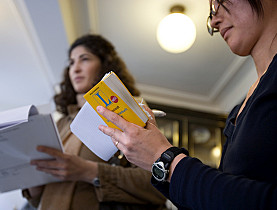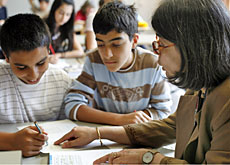Foreigners sign integration contract

Some 80 foreigners living in Basel and Zurich are about to take part in Switzerland's first integration contract programme.
But official support for the pioneering scheme varies between German- and French-speaking regions, with the latter generally more sceptical about its value in helping people feel part of Swiss society.
In all, 40 foreigners from Basel and 40 from Zurich have agreed to join the pilot project and follow a language or integration course. In return, the state will grant or extend their residence permit.
The project has generated considerable interest in Zurich.
“The demand for places on the programme has hugely exceeded supply,” Julia Morais, an integration delegate for canton Zurich, told swissinfo.
The contracts are intended to help foreigners who have difficulty or are reluctant to integrate into Swiss society, despite help from traditional programmes.
There has been much debate in Switzerland over recent months about the necessary courses of action to help foreigners successfully integrate.
In August 2007 the government announced more than 40 wide-ranging measures to improve the integration of foreigners, with languages and education taking centre stage.
“The contracts are drawn up according to very personal criteria,” explained Morais. “We look together with the individual at their objectives, the timeframe and what they need to achieve.” Morais added that they had the right to claim additional assistance.
Certain immigrants also benefit from heavily subsided rates – SFr5 ($4.97) per class.
“It’s not a good idea to make it totally free,” said Morais. “Sometimes that can be associated with bad quality. And we have to ensure complete fairness.”
Dividing line
Although no one denies the importance of learning a local language – the federal authorities have subsidised language courses since 2001 – the idea of forcing people to attend classes divides French and German speakers.
Those advocating a tough line are supporters of the rightwing Swiss People’s Party, who have been pushing for an ability to speak a national language (German, French or Italian) to be linked with a person’s residency permit. A failure to improve language skills by a certain date would result in a permit being withdrawn.
For the vice-president of the Swiss Conference of Integration Delegates, Magaly Hanselmann, learning a language should not be the sole factor when judging successful integration.
“Many Africans speak French but encounter difficulties in their professional integration,” she commented.
“As an integration specialist, I try to ensure that as many people as possible learn French,” she added. “But by forcing people to learn, I’m not sure I’d be any more successful, as an individual has to show real willingness and motivation.”
This was one of the main conclusions of a recent study published by the Swiss Refugee Council, which also claimed that an integration contract alone had little impact. According to the authors, clear objectives and sanctions are essential.
Regional differences
The Federal Migration Office downplays any regional differences and says each canton is free to choose.
“Cantons are not obliged to introduce integration contracts and linguistic knowledge is not a sole criteria, as integration courses can also be offered,” pointed out spokesman Jonas Montani.
“Language skills are nevertheless the number-one priority for the government between 2008 and 2011,” responded Hanselmann.
A model integration contract is available on the migration office’s website in the three main national languages, as well as in nine others (Albanian, Arabic, English, Kurdish, Macedonian, Russian, Serbo-Croat, Tamil and Turkish).
For 2008, the federal authorities have provided the cantons with integration grants worth SFr14 million. This amount will rise to SFr16 million annually from next year, of which SFr9 million are for language learning and training. Integration contracts are not covered by any special federal funds.
swissinfo, based on a French article by Ariane Gigon in Zurich
The foreign population of Switzerland in 2006 was 1,523,586 people.
Foreigners represent 20.4% of the total population.
They make up 25.4% of the population in the Italian-language region, 25% in the French-language area and 18.5% in the German-language part.
The Swiss electorate approved the new law on foreigners with a clear 68% yes vote in September 2006.
It limits immigration for citizens outside the EU and the European Free Trade Association (Efta) to highly skilled labour.
It also aims to encourage integration, in particular by language courses, while cracking down on human trafficking and marriages of convenience.
Foreigners also have to make efforts towards integration, according to the spirit of the law.
Foreign residents must wait at least 12 years before being eligible to apply for citizenship.
Foreigners married to Swiss nationals can take advantage of a simplified or “facilitated” procedure, reducing the number of years they have to wait.
Successful applicants must show that they are integrated into Swiss society, comply with Swiss law and pose no threat to internal or external security.
The cantonal and local authorities are responsible for naturalisation procedures.

In compliance with the JTI standards
More: SWI swissinfo.ch certified by the Journalism Trust Initiative









You can find an overview of ongoing debates with our journalists here . Please join us!
If you want to start a conversation about a topic raised in this article or want to report factual errors, email us at english@swissinfo.ch.